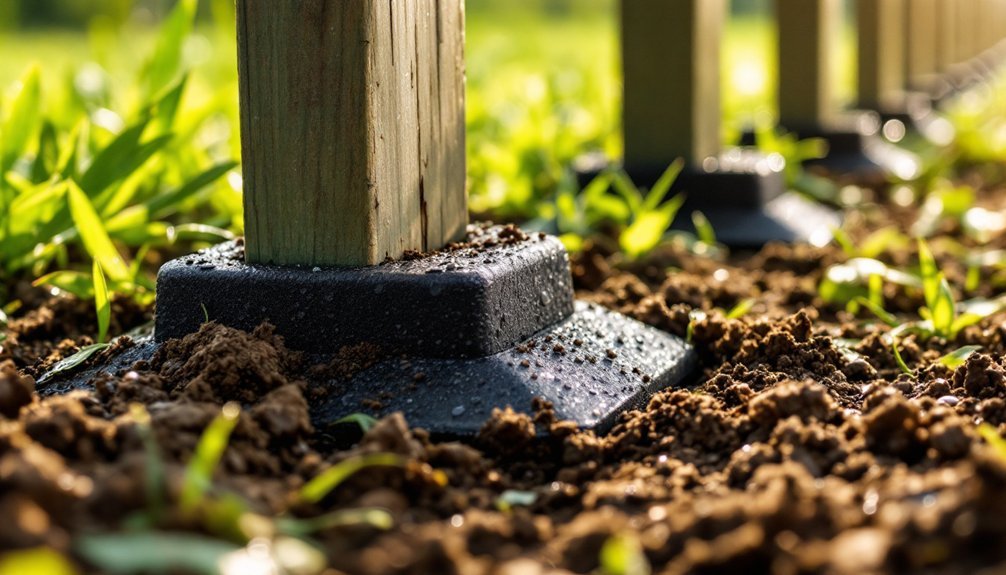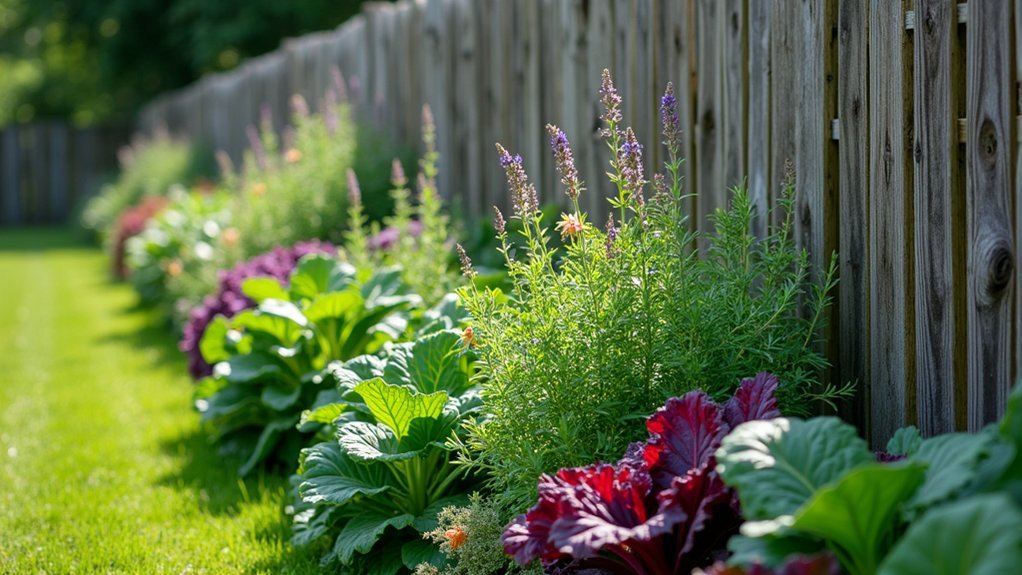You're facing a common dilemma when installing fence posts: how to protect them from ground moisture that leads to rot and premature replacement. Recycled plastic fence post bases offer an eco-friendly solution that can save you significant time and money over the years. They're designed specifically to shield wooden posts from direct soil contact while providing stable support for your entire fence structure. Let's explore the three top options that consistently outperform traditional methods.
Electric Fence Posts 48-inch (50 PCS Green Temporary Posts)
Farmers and property owners seeking flexible, temporary fencing solutions will find these 48-inch green posts particularly valuable. You'll appreciate the innovative molded clasp design that lets you adjust heights to your specific needs.
Installation is straightforward—just drive the reinforced metal stakes into the ground and secure with spring-loaded anti-rotation ball pins. While durable, you should note that extended sun exposure may cause fragility.
These versatile posts work well for garden landscaping, property boundaries, and livestock containment. They're effective at deterring wildlife like deer and bears from your property, all at a price point that's typically more affordable than farm supply alternatives.
Best For: Homeowners, farmers, and property managers seeking affordable, temporary fencing solutions that offer flexibility for livestock containment, garden protection, or wildlife deterrence.
Pros:
- Innovative adjustable height design with molded clasps allows for customization to specific fencing needs
- Easy installation with reinforced metal stakes and spring-loaded anti-rotation pins for stability
- More cost-effective than comparable options found at farm supply stores while maintaining similar quality
Cons:
- Posts may become brittle with extended sun exposure, reducing long-term durability
- Some customers reported receiving damaged packages upon delivery
- Potential bending or stability issues if not properly installed in suitable ground conditions
Electric Fence Posts, 48 inch Step-in Posts for Farm Protection (25 Pack)
Rural property owners looking for a versatile and efficient fencing solution will find the Electric Fence Posts 25-pack an excellent investment. These 48-inch posts (with 39 inches exposed) combine high-strength polyethylene with reinforced metal stakes for durability in various conditions.
You'll appreciate the innovative molded clasp design for height adjustments and spring-loaded anti-rotation pins that secure posts firmly. Installation is straightforward—simply drive stakes into the ground using the footrest with anti-twist tip.
At $99.99 (with 20% coupon available), they're cost-effective for temporary fencing needs compared to big box alternatives, though green posts may be less flexible than other colors.
Best For: Rural property owners, farmers, and gardeners seeking affordable, portable fencing solutions for temporary containment, rotational grazing, or garden protection.
Pros:
- Easy installation with spring-loaded anti-rotation pins and footrest design that prevents twisting during insertion
- Versatile height adjustment through innovative molded clasp design allowing customization for different livestock needs
- Cost-effective at $99.99 for 25 posts (with 20% coupon available), making them economical for temporary and rotational fencing applications
Cons:
- Green posts reportedly less flexible than other color options, which may affect performance in certain applications
- Some users report packaging damage during shipping that can impact product quality
- Performance varies in different soil conditions, with potential stability issues in extremely sandy, wet, or rocky terrain
Fence Post Anchor Metal Ground Spike for 4×4 Posts (Pack of 4)
DIY enthusiasts looking for a quicker, no-concrete solution will find the Kdgarden Fence Post Anchor Metal Ground Spike system invaluable for their projects. These heavy-duty powder-coated steel spikes drive directly into soil, eliminating the need for digging and concrete work.
You'll appreciate how these 24-inch anchors protect wooden posts from ground moisture while providing remarkable stability. At 15 pounds per pack, they're built to last with rust-resistant 12-gauge steel. They're perfect for fences, mailboxes, decking, and even solar installations.
Installation is straightforward—just hammer them in and secure your 3.5×3.5 posts with the included screws. With a 4.6-star rating, they're proven performers.
Best For: DIY homeowners and landscapers seeking a quick, concrete-free installation method for wooden posts in fence, mailbox, garden trellis, or decking projects.
Pros:
- Heavy-duty powder-coated steel construction provides excellent durability and rust resistance
- Eliminates time-consuming digging and concrete pouring, significantly speeding up installation
- Protects wooden posts from ground moisture damage, extending the overall lifespan of structures
Cons:
- At 15.02 pounds per pack, they're relatively heavy to transport and maneuver during installation
- May not provide sufficient stability in extremely loose or sandy soil conditions
- Requires hammering force to install, which might be challenging for some users without proper tools
Factors to Consider When Choosing Recycled Plastic Fence Post Bases for Ground Contact Protection
When you're selecting recycled plastic fence post bases, you'll need to evaluate both material durability and weather resistance properties to guarantee long-term protection against rot and degradation. Your installation process will vary in complexity based on soil type compatibility, with clay, sandy, and loamy soils each requiring different anchoring approaches. Choosing eco-friendly recycled plastic options reduces environmental impact while still providing robust ground contact protection for your fence system.
Material Durability Considerations
Although traditional wooden fence posts can deteriorate rapidly in soil contact, recycled plastic fence post bases offer superior durability for ground installation. When selecting these bases, you'll want to prioritize high-density polyethylene (HDPE) materials that resist chipping, peeling, and rust that typically plague metal alternatives.
Look for products with a minimum thickness of 1/4 inch to guarantee they can withstand the constant pressure of ground moisture and seasonal temperature fluctuations. The best recycled plastic bases include UV inhibitors to prevent sun damage, which is vital for maintaining structural integrity over time.
With proper selection, you're investing in a solution that can last over 20 years—making recycled plastic bases not just environmentally responsible but also economically sound for long-term fencing projects.
Installation Complexity Assessment
Beyond material durability, the installation process itself deserves careful attention when selecting recycled plastic fence post bases. You'll want to evaluate your ground conditions first—sandy, wet, hard, or rocky soil will each present unique challenges that affect installation ease.
Check whether the post bases feature pre-drilled holes or require specialized tools. Lighter bases are generally easier to position and handle during setup, saving you time and effort. If your installation method involves driving posts into the ground, select materials resistant to bending or breaking under pressure.
Look for products that include installation aids like alignment tools or guides. These seemingly small accessories can dramatically simplify the process and guarantee better stability once your fence is complete. Proper assessment of these factors will help you choose post bases that offer both durability and installation convenience.
Soil Type Compatibility
The soil beneath your fence plays a crucial role in determining which recycled plastic fence post bases will perform best on your property. Different soil compositions create unique challenges that require specific solutions for ideal stability.
In sandy soil, you'll need bases with wider footprints or deeper anchoring systems to compensate for the loose, quick-draining nature that provides less natural support. Clay soils present the opposite problem—their tendency to expand and contract with moisture changes can stress your posts over time, requiring flexible yet sturdy bases that can withstand these movements.
Rocky terrain demands bases specifically designed for difficult installation conditions. Look for models with tapered designs or those compatible with specialized installation tools that can navigate around stones while maintaining structural integrity.
Weather Resistance Properties
When selecting recycled plastic fence post bases, durability against harsh environmental elements should be your primary consideration. These bases excel in moisture resistance, unlike wooden alternatives that absorb water and deteriorate over time. You'll find they won't rot, decay, or corrode when exposed to rain or ground moisture.
Look for UV-stabilized options that can withstand prolonged sun exposure without fading or becoming brittle. The non-porous nature of recycled plastic prevents mold and mildew growth, further extending their lifespan in outdoor settings. You'll also appreciate their ability to maintain structural integrity across temperature extremes, from summer heat to winter freeze.
These weather-resistant properties guarantee your fence remains stable and secure year-round, reducing maintenance needs and replacement frequency compared to traditional materials.
Environmental Impact Factors
Selecting environmentally responsible fence post bases requires you to contemplate several key sustainability factors beyond just functionality. When you choose recycled plastic options, you're diverting materials from landfills while simultaneously reducing demand for virgin plastic production.
The manufacturing process for recycled plastic bases typically consumes less energy than creating new plastic products, resulting in a smaller carbon footprint for your fencing project. These sustainable alternatives also contain fewer toxic chemicals than their virgin counterparts, minimizing harmful environmental effects.
Design Flexibility Needs
Beyond environmental considerations, understanding design flexibility becomes a practical necessity when selecting recycled plastic fence post bases. You'll want to assess height adjustment capabilities, as some designs allow you to customize fence line heights for varying landscape requirements.
Look for bases with innovative molded clasp designs that prevent twisting during installation, guaranteeing a secure fit for ground contact. Additionally, check compatibility with your post sizes to assure effective support and protection.
Consider the weight and material durability to verify your bases will withstand environmental elements without chipping, peeling, or rusting over time. For maximum flexibility, prioritize designs that eliminate digging or concrete requirements, offering a less labor-intensive installation process that allows for easier adjustments or relocations if your needs change in the future.
Weight-Bearing Capacity Analysis
Although recycled plastic fence posts offer eco-friendly benefits, their weight-bearing capacity remains the critical factor determining long-term performance. When selecting your bases, prioritize those made from high-density polyethylene (HDPE), which delivers superior strength compared to lower-grade plastics.
Pay attention to the thickness and design of the base. Thicker profiles resist bending under pressure, while wider bases distribute weight more evenly, preventing sinking or tilting. Don't overlook how your soil conditions affect performance—bases installed in softer, moisture-rich soil may require additional reinforcement.
For critical applications, look for products with documented static load test results. These quantitative measurements provide reliable evidence of a base's ability to support your specific fence requirements under real-world conditions.
Cost-Benefit Ratio Examination
When you're evaluating recycled plastic fence post bases for your project, understanding the complete cost-benefit ratio becomes essential rather than just comparing initial price tags. At $2-$10 per unit, these bases offer significant savings compared to traditional options exceeding $15 each.
While you might pay slightly more upfront than for some wood alternatives, consider the long-term economics. Recycled plastic's resistance to rot, decay, and insects eliminates frequent replacement costs. Many products include warranties ranging from 5-25 years, providing financial security against premature failure.
Don't overlook potential regional tax incentives or rebates for using environmentally friendly materials. These additional savings, combined with minimal maintenance requirements, typically result in a substantially lower lifetime cost despite the initial investment—making recycled plastic bases a financially prudent choice for sustainable fencing.
Frequently Asked Questions
What Is the Expected Lifespan of Recycled Plastic Fence Post Bases?
You can expect recycled plastic fence post bases to last 15-25 years. They'll outlast traditional wood options since they won't rot, crack, or suffer insect damage when in contact with soil.
Can Recycled Plastic Posts Withstand Extreme Temperature Fluctuations?
Yes, recycled plastic posts can withstand extreme temperature fluctuations. You'll find they don't crack in freezing conditions or warp in intense heat, unlike wood. They're engineered to maintain structural integrity year-round in various climates.
Are These Post Bases Approved for Organic Farming Applications?
Most recycled plastic post bases are organic farming approved as they don't leach chemicals into soil. You'll want to verify specific certifications though, as some may contain additives that aren't permitted in organic operations.
How Do Recycled Plastic Posts Compare to Concrete for Stability?
Recycled plastic posts offer comparable stability to concrete while being lighter and easier to install. You'll find they won't crack or deteriorate like concrete can, and they're much simpler to remove if needed.
Can I Install Recycled Plastic Fence Post Bases in Rocky Soil?
Yes, you can install recycled plastic fence post bases in rocky soil. You'll need to clear larger rocks first, possibly pre-drill holes, and use a sledgehammer for installation. They're actually quite adaptable to difficult terrain.





Leave a Reply